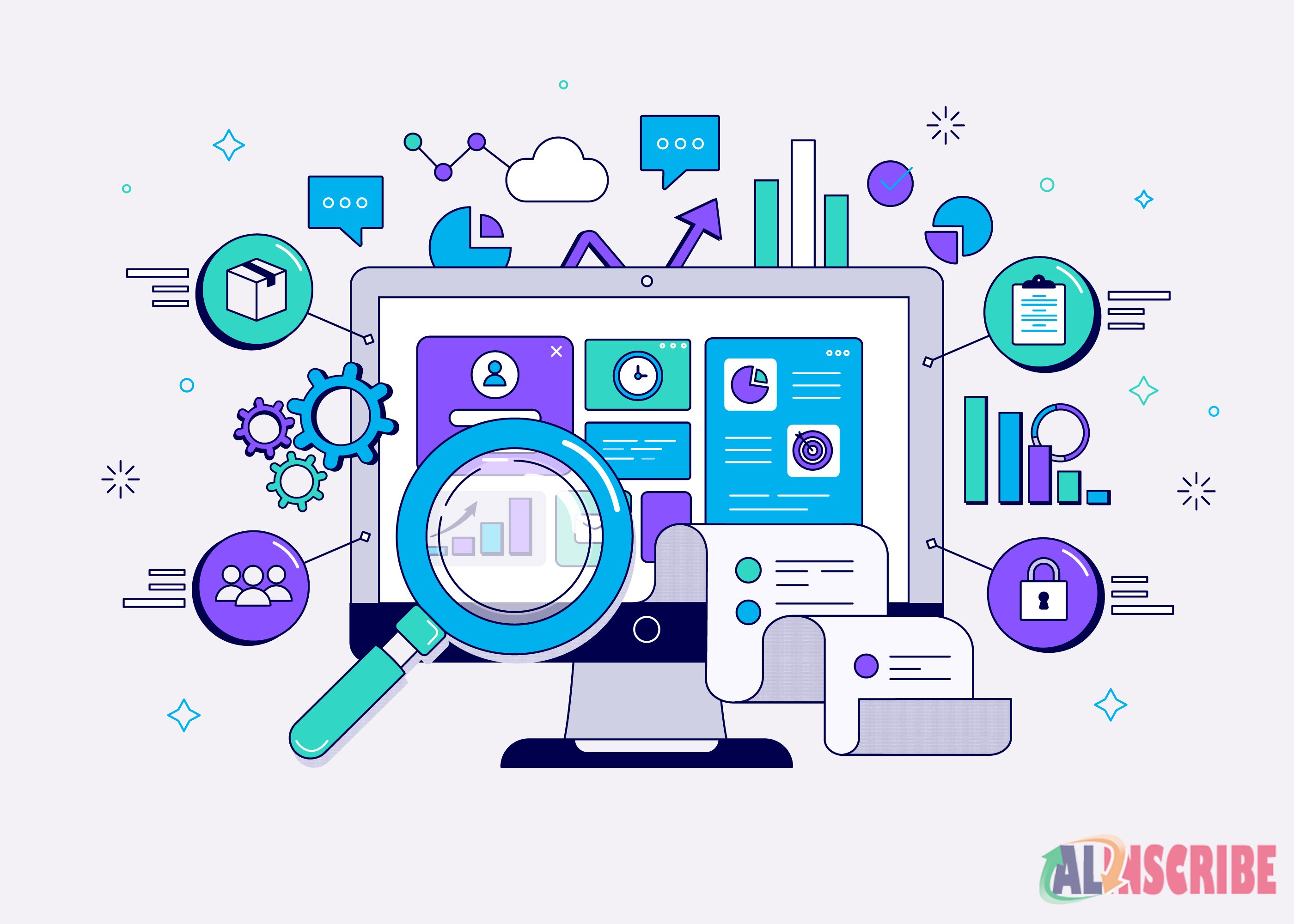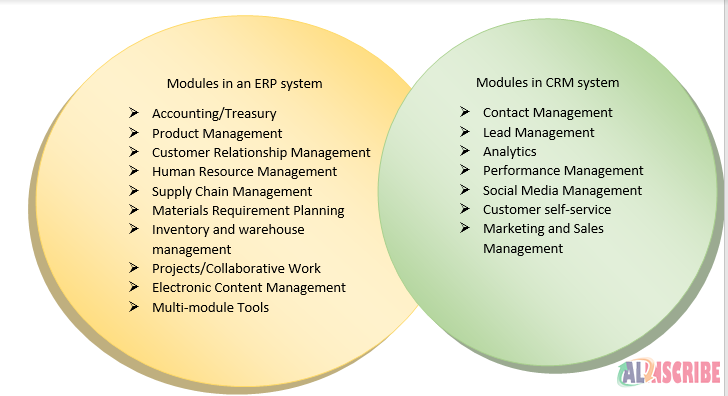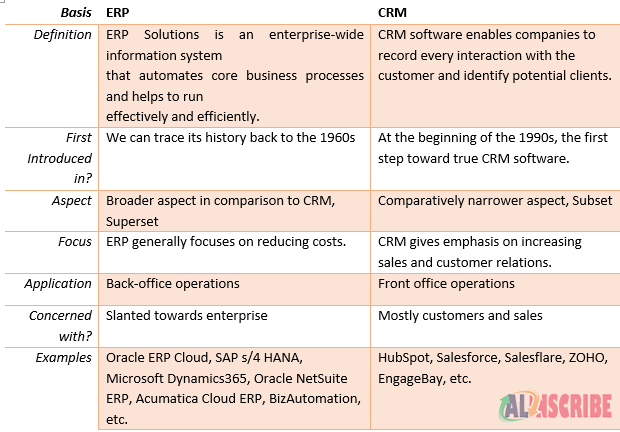ERP Vs. CRM: Best Fit For Your Business

Although ERP and CRM terms are used interchangeably, these two acronyms slightly differ with reference to their meaning and functionality. Many business organizations find themselves in an exceeding dilemma about whether to decide on ERP or CRM software that most closely fits their business model. This article will serve you as a guide and here is where the hustle between ERP Vs. CRM ends!
What is CRM?
CRM stands for Customer Relationship Management. As the name suggests, CRM software enables a company to set up perfect relationships with its customers. It analyzes customers’ behavior and interactions, attracts new customers, and keeps the old ones. It drives sales growth by automating the sales pipeline, thus also referred to as Sales Force Automation. Not only does it help in the smooth transitioning of leads into customers but also provides companies with the right acumens to pinpoint their target audience.
For offering better and enhanced recommendations to the clients, CRM software holds all the details of customers that record their personal details as well as purchase histories. Other than storing the static information like name, address, contact number, email address, etc. CRM helps in capturing more complex and dynamic data and enables companies to rise to the next level. It helps to differentiate between hot and cold leads via lead scoring. Let’s take an example- If a customer’s behavioral pattern shows that he/she is interested in buying customized denim jackets, your system can utilize that information to deliver prodigious suggestions in which the customer might be interested.
Benefits of CRM:
- The Basic Advantage: The fundamental advantage of the CRM system as its name suggests is boosting, amplifying, and strengthening customer relationships. Preferably, it improves existing customer affiliations, finds new customers, and sets up new market segments.
- Escalation of Customer Revenues: The advantages of CRM extend beyond its basic functionality. CRM data also certifies effective synchronization of marketing crusades by introducing innovative ideas to attract customers like loyalty programs easing a high customer retention ratio.
- Clinch the Deal: The CRM system also helps the sales rep to seal the deal faster by facilitating expedited and efficient response to prospects, leads, and potential customers. When customers are swayed away by the precise retorts, it results in the conversion of their inquiries into purchases.
- Streamlining Sales and Marketing Process: Due to the centralization of the entire organization’s data and optimization of business processes, it becomes easier to identify errors which save time and ultimately results in the achievement of more sales. It upgrades the customer’s overall experience through direct interactions right from sales to marketing to customer service.
- Facilitates lucrative and optimized marketing: The company which understands its customer’s desires and wants is more likely to retain and attract potential customers. The sales representatives get an overview of the most lucrative leads and customer groups that are believable to profit the business. This way CRM system helps in optimum utilization of business resources and creating marketing campaigns meaningful
What is ERP?
The full form of ERP is Enterprise Resource Planning. It is an integrated software system that helps business run effectively and efficiently by automating core business processes. ERP software has evolved over the years and now it can be remotely accessed. It is an immeasurable subject matter that cannot be summed up in a couple of paragraphs. It is a combination of different modules such as human resource management, inventory management, financial and accounting, product management, supply chain management, materials requirements planning, and many more. Accounting and Treasury are the crucial segments of an organization and implementing ERP systems can benefit them by syncing information in one common database and making information reliable, more accessible, and hassle-free.
Benefits of Enterprise Resource Planning:
- Real-Time Information:- The chief advantage of ERP software is based on real-world operations. It not only provides you with accurate facts and figures within a fraction of seconds with its real-time capabilities but with the assistance of a cutting-edge business intelligence ERP system delivers prompt updates facilitating more informed evaluation and decision-making.
- Integration of Information:- ERP systems possess the feature of integrating enterprise information and spontaneously updating them among related business functions and departments.
- Lead-time Diminution:- ERP enables reduction of lead time but first, we should know what lead-time refers to. The latency between the initial point and termination of a certain task is considered to lead time. Thus, by its virtue of integrated nature, ERP systems lessen the lead times and organizations can obtain the product as and when required.
- Modular Architecture:- ERP software has a modular software design sharing a common database. Each module is strategized for specific business functions without disturbing the other module’s functions. Nowadays, we can find numerous ERP vendors serving the best of breeds regarding a certain module such as Salesforce which is a CRM cloud solution that is pioneered in sales, marketing, customer service, and lead scoring and related pieces of stuff.
- Prompt Shipment:- Customers love when the product is delivered to them on time. ERP system helps to accomplish the same as all the business functions are integrated the errors are to a lesser extent and production efficiency is elevated. Therefore, this arrangement of ERP systems guarantees on-time delivery of goods to its customers.
- Optimum Utilization of Resources:- Productivity is never an accident. It is always the result of a commitment to excellence, intelligent planning, and focused effort- Paul J. Meyer (“Quote by Paul J. Meyer: “Productivity is never an accident. It is ...”)The ERP system helps in effective and efficient coordination of business functions where the stock list is kept to a minimum, machine downtime is most minuscule, and enterprise toil towards the achievement of profit gains and sustainable growth.
- Superior Customer Satisfaction:- Customer satisfaction is one of the essential elements for a business organization to sustain itself in the market. ERP systems today foster healthier customer relationships through lead generation, lead scoring, and quote tracking, and ultimately propitiate customers through regular support and maintenance.
- Easy Projection and Reporting:- ERP brings rationality and sanity to departments of production and sales, inventory procurement plans, and lead generation. It enables the generation of reports of various kinds based on historical dealings and transactions. Thus, circumventing the issue of out-of-stock or superfluous inventory conditions.
ERP vs CRM
As already stated above, ERP and CRM are substitutable terms but the hustle between them is yet not over. The primary difference between both is that ERP is significant for financial data and reporting which best suits the accounting/treasury department whereas customer-related data and information are supported by CRM systems which are ultimately consumed by sales and customer service departments. ERP systems help organizations in running efficacious and fruitful businesses by linking pecuniary and operational systems to a centralized database while CRM deals with managing and automating its sales pipeline and customer relationships.

From the above diagram, you can see that the module CRM is included in ERP systems, but CRM systems do not include ERP components. It is because ERP is much broader than CRM systems. It provides a holistic view of all the modules that a business organization might need. The former supports the back-office operations and it’s a complete package while the latter wires the frontal operations and manages its interactions with customers.
CRM is a major for the sales rep. In order to boost sales, capture more leads, and repeat customers, CRM can prove to be a standalone solution. ERP performs backstage, i.e., that is invisible to the customers like procurement, supply chain management, inventory management, financial capital management, order fulfillment, shipment, human resource management, etc.
Difference between ERP and CRM systems:

What Should a Business Organization Choose?

Keeping in mind that no two organizations are the same, therefore, ERP and CRM are two different approaches to meeting your business requirements. Although they both are imperative and vital management systems and serve different purposes with imbricated functionalities. When the question arises, CRM Vs. ERP, which is better, what should a company choose, and dissimilarities between them, the answer to these queries is quite simple, unbiased, and unpretentious, yet it comes with many nuances.
So, what you should go for? Do you need CRM vs. ERP? Well, let’s start off with CRM solutions. If you are a small or medium enterprise, startup, and sole entrepreneur, you should probably prefer CRM solutions. Also, if your business supplies personalized services, in which customer interactions and relationships are the KPI (Key Performance Indicator) CRM is your thing!
If you wish to-
- Improve your customer service
- Reduce your customer rate of attrition/ customer churn
- Better understand your sales pipeline
- Develop a more operative and efficient lead generation strategy
- Make your team more efficient and systematized
If you are able to pinpoint what you hope to achieve out of installing a CRM solution, then you are good to go. Currently, there are few, decent CRM solutions providers. Salesforce is one such example. It specializes in CRM services and is a cloud-based software. It is a popular tool for customer support and sales and marketing worldwide.
Now, as we have discussed pretty much about CRM, let’s hop on to ERP systems. ERP needs no definition as it is a whole subject. What we need to understand is that the ERP system’s main job is to streamline core business processes and manage all aspects of the business organization right from supply chain management to financial and accounting data management to payment gateway. With the help of a centralized database, an ERP system can help you to optimize business operations.
The right ERP system will assist you in achieving the following-
- Tracking of real-time data within as well as across the departments
- Order processing, accounts update, billing, and order fulfillment
- Supply and manufacturing chain management
- Forecasting and reporting without any human error
- Chase employment productivity and helps to reduce employee turnaround
- Tracking recruitment and hiring process
- Managing tickets and agendas
- Facilitating benefits, payroll, and other related information of employees and third parties
If an organization is quite large and diversified, then it will entail different modules which are only possible through ERP implementation. The future scope of the ERP market is significantly huge and mammoth sized. The market is anticipated to grow from $49.28 billion to $90.63 billion by 2029. There’s no doubt ERP has incredible benefits!
When you have such a colossal, and enormous organization to run, being overwhelmed while choosing ERP systems is totally fathomable. It becomes quite daunting and intimidating to figure out which ERP system might be the best fit for your company. Thus, we bring to you the list of top 10 ERP systems (2025) with the hope that it will end your predicament!
- Microsoft D365
Microsoft Dynamics365 ranks no. 1 in this top 10 list of ERP systems. The major reason why D365 is number 1 is partly that D365 offers two distinct solutions. There’s Business Central which caters to all the needs of small and medium-sized (SME) enterprises and then there’s Finance and Operations which serves all larger, more complex organizations. Besides, companies are super comfortable with the user interface of Microsoft, and hence value its flexibility.
- Oracle NetSuite
Coming at number 2 is Oracle NetSuite, which mastered cloud applications long ago about 20 years. Thus, it has a very mature yet advanced solution which the other ERP vendors had been trying to play catch up. NetSuite also lays emphasis on small and mid-cap companies so, if you fall in one, or just searching to upgrade from your basic accounting system, NetSuite can be your reliable option. - Tactic ERP & CRM
On the third place we have Tactic ERP & CRM, which is respectively new but one of the most flexible ERP systems you can get your hands on. Tactic boasts a set of 79 modules that consist of both ERP and CRM features. Hence, choosing Tactic is a win-win situation for companies which need the assistance of both of the mentioned systems. It is also extremely affordable, making it the best choice for small and medium sized companies. - Oracle ERP Cloud
Ranking at number 3 is Oracle ERP Cloud which is fairly a flexible product which is why its implemented by Fortune 1000 Companies. Oracle NetSuite can be tailored effortlessly but there’s a lot of manufacturing know-how that is still work-in-progress. It is undoubtedly a robust solution that caters to different industry requirements. Having said all that, if you are a larger and diversified organization with more complexities with ease of integration, then Oracle NetSuite is your perfect gift. - SAP s/4 HANA
SAP s/4 HANA bears strong financial and accounting modules, so if you are looking for robust inventory management and basic ERP functionality dealing with the sort of regular forecasting and reporting, GL and charts capabilities, product costing then s/4 HANA is really one of the best. What’s holding back the product is its age-old legacy SAP products, which don’t allow it to be as mature as the market demands. - IFS
IFS stands for Industrial and Financial Systems. It preferably caters to a niche market as it has a very focused solution. If you are a company with a lot of project management, asset management, and maintenance types of functions, then IFS can be a good fit. - Infor CloudSuite
On number 6 falls Infor CloudSuite. The admonition I would like to add here is that the Infor CloudSuite umbrella is quite expansive and wide-ranging as there are multiple systems under one Suite. M3 is a product that is often used in manufacturing segments, Infor Syteline can also be counted in the same. There’s Infor Nexus which offers high-end solutions to a supply chain management unit. Not only manufacturing but non-manufacturing organizations are also using Infor CloudSuite successfully. - Sage X3
Sage X3 is ranked number 7 this year, the reason behind this downfall is that Sage X3 has become a considerably less desirable product than it was before because other vendors have made further advancements. Overall, it’s a great product with a strong core financial system for large manufacturing organizations, but if you wish to expand beyond a couple of things, then it may test the boundaries of your requirements. In addition to it, its user interface is also not as clean and user-friendly as other systems in the ERP market. - Odoo
Coming at number 8 is Odoo which is an open-source ERP system. It has great functionality and capabilities which makes it suitable for small and mid-sized enterprises. The shortcoming of open-source ERP systems can be their price tag, as you start adding up modules and other functions, the costs start escalating. Another downside of Odoo is that it can become complicated at times in terms of maintenance, thus, if you don’t have a well-built, mature, and sophisticated kind of IT department, then Odoo is certainly not the right choice. It can best suit those companies that look for maximum flexibility and modularity. - Salesforce/FinancialForce
Often Salesforce is considered purely a CRM system but it’s also known as FinancialForce on the financial side. Extensions like Rootstock is an ERP vendor built on Salesforce providing financial manufacturing capabilities. Salesforce can prove to be a good fit if the organization is in search of the best-of-breed and flexible solution.
Finale: Concluding Thoughts: -
We have come to the end of this discussion of ERP Vs. CRM. The choice of choosing ERP over CRM or CRM over ERP can typically depend on 3 critical aspects-
- The size of your business organization
- The scale of your business activities
- The nature and complexities of your business
For instance, if the business runs on a small scale, then, to raise your customer base you may choose CRM systems. Also, if you wish to focus on your potential customers and leads, and sync sales and marketing functions then you must opt for CRM systems. Contrary to that, if you are a larger, more complex organizations that wish to integrate and streamline all processes, cut down operational costs and maximize ROI, then you may go for ERP.
Wrapping it up!!
After the evaluation, still some of you might be puzzled, wondering what to choose, right? There is a third option available which is the integration of both ERP and CRM solutions to maximize the value added by both systems. You need not purchase both from the same vendor. You just must pay heed to your unique needs, future goals and objectives, organization vision, and mission which by the way are two different terms, IT strategy and infrastructure and you are all set. With this fundamental approach, you can not only alleviate your risks but also maintain a competitive edge in the market. Integration of ERP and CRM systems can prove to be a great match that can drive your efficiency and profitability!
Article Comments
Similar Articles
Articles Search
Sponsor
There are zero sub-categories in this parent category.
There are zero sub-categories in this parent category.
There are zero sub-categories in this parent category.
















